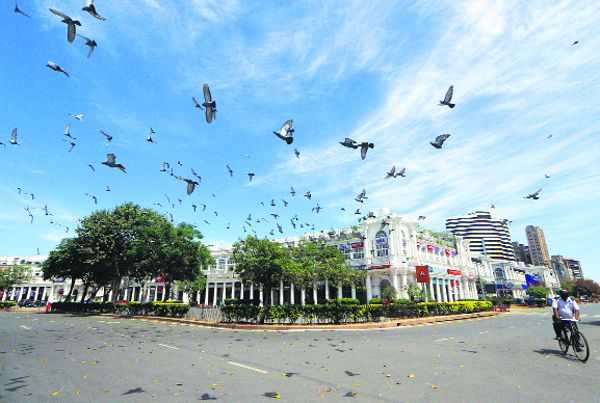
Relook: Ecological takeaways from the lockdown will force rethink on engaging with the environment.
Dinesh C Sharma
Journalist and Author
Clear blue skies, birds chirping throughout the day, peacocks dancing in residential areas, nilgais roaming around in city streets, improved air quality in metros and towns, leopards making an appearance on the periphery of human settlements, aquatic life returning to rivers and streams, noise pollution under control and drastic reduction in global carbon emissions. All this may appear to be the environmental bonus of the
lockdown imposed to address the coronavirus pandemic. It has made people realise what they have been missing and may have brought about greater environmental consciousness among some of us.
However, we know that these are temporary gains. Can these gains be sustained? How can we continue to maintain the ambient air quality seen during the lockdowns or keep carbon emissions at the level of the past few weeks? These are the questions to ponder on World Environment Day today.
The green gains are the result of the change in the behaviour of humans forced due to the lockdown. Major sources of air pollution — automobiles, factories, construction activity, public transport, industries — have remained shut for most part of the lockdown. This helped improve the quality of air. Since people were off the streets, wildlife returned to what used to be its territory previously. Water quality was better marginally at many places as industries stopped releasing effluents, though municipal sewage continued to flow into the water bodies. The process of relaxing the lockdown in the past 10 days shows that these gains are not sustainable. Cars and two-wheelers have returned to roads in many cities, factories are slowly resuming production and coal-based power plants are back in business. The day is not far when birds will become invisible again, nilgais will retreat and the air becomes foul. Soon, it will be ‘business as usual’ as far as environment is concerned.
The pandemic has provided an opportunity to the people, policymakers and governments to rethink how humans and societies engage with the environment. And this issue is closely linked with development and economic progress. For decades, we have been told that some environmental damage is inevitable in the process of achieving growth and development.
Now, it is time to re-examine this notion. The pandemic has brought the engines of the so called growth to a halt. It has exposed the fragility of the model that chases GDP with manufacturing and exports without caring for the environment and labour rights. Millions of people who were oiling this engine have been forced to walk back to the villages.
We can restart the engine the old way or make a fresh start that ensures development and economic wellbeing without being unfriendly to the environment. This is a choice India and the world have to make as we plan for a post-Covid world.
Indications from the government are not promising. It appears that India is going to continue with the old ways. The government and industry leaders are talking of making India a hub of manufacturing for companies wanting to relocate from China. They feel that India can replace China as the factory of the world, ignoring the ecological costs involved. For instance, financial incentives have been announced for mobile phone manufacturers wishing to expand their production or stating new facilities here.
In addition, environmental laws and regulations are being eased for attracting manufacturing industries as these regulations — along with labour laws — are seen as irritants by the foreign investors and manufacturing industries. The lockdown period has been used by the environment ministry and its agencies to clear a number of projects in environmentally sensitive zones, including tiger reserves. The process to dilute rules for Environment Impact Assessment (EIA) is also under way.
How government departments and project proponents try to dodge environmental laws is clear from the Central Vista redevelopment project in the national capital. In order to avoid a full EIA — including public hearing — as mandated, the government has chosen to seek clearances for ‘renovation and expansion’ of the Parliament building which is misleading. The gas leak in the LG plant at Visakhapatnam during the lockdown period is also a grim reminder of the lax enforcement of environmental norms by governments too keen to attract foreign direct investment.
The economic stimulus package announced by the Prime Minister is designed to boost ‘business as usual’ for economic growth and does not in any way promote sustainable development. For example, a massive stimulus has been given to the coal industry while ignoring renewables or electric vehicles. If all the promised money for different sectors is indeed made available, the resulting activity will add to carbon emissions. The auto sector is already talking of an uptake in the demand for cars and two-wheelers as people may either shun the use of public transport or public transport may find it difficult to run to full capacity in the post-pandemic era. Instead of letting more automobiles on the already congested roads and adding to air pollution, our policies should encourage cycling as a mode of transport in cities. This can be done by investing in developing safe infrastructure for cycling. Another way could be to incentivise ‘work from home’ or teleworking options. On all such counts, the stimulus lacks innovation. It was a golden opportunity to break from the past and make a new start, but the government has chosen not to do this.
While the pandemic has provided an opportunity to relook at the development model, it is also a warning of more such pandemics in future if damage to the biodiversity continues. The threat of zoonotic diseases due to unknown pathogens is real, and will increase in future as we go on denuding forests and disturb wildlife there. More and more viruses of animal origin, like the one causing havoc now, can jump species and start infecting humans as we continue to disturb the ecological balance.
That’s why scientists are calling for a ‘one-health’ approach that recognises inter-connectedness of humans, plants and animals so that the policies could be designed to address them holistically. This is the need of the hour.
Join Whatsapp Channel of The Tribune for latest updates.




























